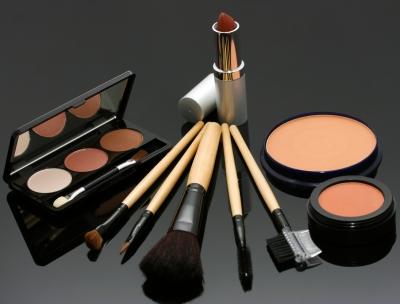
The biggest open secret in the cosmetics industry today is that human skin is porous and can absorb at least some of the ingredients in makeup and body care products. If the cosmetics industry would concede this small fact, cosmetics would have to be classified as drugs and would therefore be subject to regulation.
As it stands in the US, the cosmetic industry is self-regulating and is not even required to list all of the ingredients on the packaging. Terms such as "natural," "herbal," and "organic" are often meaningless at best and deceptive at worst, as there is no control over their use. Since 1938, only 8 of the more than 12,000 ingredients found in cosmetics have been banned by the FDA. It is a veritable Pandora's Box few seem willing to open.
Snacking on your mascara and lipstick is not generally recommended, but perhaps this should be the acid test for whether cosmetics are safe enough to use. If you can't safely eat it, you shouldn't be putting it on your body either. In fact, eating cosmetics might even be less dangerous because at least the substances in them would be broken down by saliva and stomach juices on the way to the bloodstream. Anything applied topically to porous skin goes straight into the bloodstream, bypassing these protective mechanisms.
It is estimated that the average female consumer in Western countries uses 12 personal care products containing 168 ingredients on a daily basis. Men average 6 products containing 85 ingredients. Of course, some of these ingredients are as inoffensive as water, but there are myriad other components that are not so innocuous. Carcinogenic chemicals, petroleum derivatives, preservatives, estrogen mimics, triclosan, lead, and mercury all appear in thousands of everyday cosmetic products.
The problem is not necessarily what we do know about these chemicals, but what we don't. The consequences of long-term exposure to chemicals and their cumulative effects are unknowns. Even when the chemicals used in cosmetics are studied, they are examined in isolation. What happens when these chemicals combine? The synergistic effect may be exponentially worse.
What price beauty?
Supermodel Linda Evangelista once said she doesn't even look like the Linda Evangelista we see in magazines. We are largely being sold a bill of goods. The cosmetics industry is built on smoke and mirrors, aided and abetted by airbrushing and computer technology.
We tend to believe that if a cosmetic item carries a hefty price tag, then it must be something magical and effective. The price probably reflects the cosmetic's expensive packaging, advertising, and marketing, rather than valuable ingredients. Ironically, some of the ingredients in cosmetics that promise to make us look younger have been linked to premature aging of the skin as well as cancer, skin allergies, and irritation.
Good Hair & Skin is an Inside Job?
If your diet is less than optimum, it doesn't matter how many lotions and potions you slather on from the outside, your looks will still suffer. Good nutrition is much better insurance against aging and skin damage than any cosmetic. Eating a nutrient-rich diet has the added advantage of helping your body rid itself of accumulated chemicals. (Nutrients particularly helpful to the skin include vitamins present in animal meat, fats and organ meats; colorful vegetables and limited fruits are helpful when taken in addition to the basic foods.)
There are many simple, nontoxic alternatives to commercial cosmetics, most of which can be made at home using natural ingredients. Coconut, jojoba, and olive oils have been used successfully for centuries. Mineral makeup is another viable alternative. The main ingredients in mineral makeup are zinc oxide and titanium dioxide. They don't clog pores, and they do act as a physical barrier against too much sun exposure. Consumers are also driving the market by demanding more transparency and less toxicity from cosmetics manufacturers, and there are some ethical and committed companies answering the call.
Certain commercial cosmetic and skin manufacturers are committed to safety while maintaining the highest aesthetic standards. Our store currently carries several lines of skin care products and will be carrying make-up options in the future.
From Dr. Deborah's Desk
My mother didn't wear much makeup, but followed in her own mother's footsteps with a diagnosis of breast cancer. I subject all "supporters"of breast cancer to an intense scrutiny: are you as interested in preventing breast cancer as you are in curing it? I am very interested in the Safe Cosmetics Act (H.R. 2359 in 2011) which gives consumers a real chance at creating legislation that eliminates harmful chemicals from body care products for men, women, and children. I only support groups that agree with protecting us, such as the Breast Cancer Fund. At the time of this writing, the Susan G. Komen Foundation does not endorse the Safe Cosmetics Act.
Please visit the websites for Campaign for Safe Cosmetics and Environmental Working Group for information on the safety of your favorite body care products.
